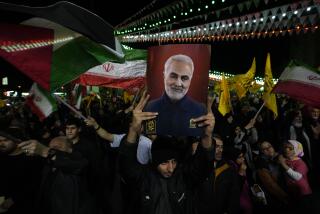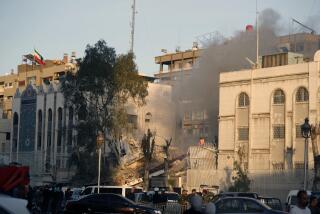Syria bows to pressure, will admit Arab peace observers
Under mounting international pressure, Syria said Monday that it would admit Arab observers to monitor a regional peace initiative aimed at ending months of bloodshed that is threatening to push the country into civil war.
An advance team including legal, administrative, financial and human rights experts is expected to head to Syria within days, said Arab League Secretary-General Nabil Elaraby. There were no immediate plans to lift regional sanctions on Syria, as requested by the government, he said.
Syrian Foreign Minister Walid Moallem called the signing of the agreement, which took place at the league’s headquarters in Cairo, “the beginning of cooperation between us and the Arab League.”
But opposition activists dismissed the move as a ploy, saying that security forces killed dozens of people Monday, including as many as 72 soldiers said to have been gunned down as they tried to defect near the Turkish border. If true, it would be one of the deadliest days in a nine-month uprising that has posed the most serious threat yet to President Bashar Assad’s regime.
The head of the Syrian National Council, the most prominent opposition bloc, accused the government of “maneuvering” to buy time and avoid wider international intervention in the crisis.
“They have no intention of implementing any initiative,” Burhan Ghalioun told reporters in Tunisia. He called for limited military intervention to set up “protected zones” in the country.
The Arab League had threatened to ask the United Nations Security Council to intercede if the protocol was not signed by Wednesday.
Syria has found itself increasingly isolated over its handling of the crisis, which the U.N. says has claimed more than 5,000 lives since the start of major antigovernment protests in March. The government blames the bloodshed on what it describes as armed terrorist gangs, incited and supported from abroad. It says more than 1,100 security force members have been killed.
The league, which has often been criticized for refusing to stand up to member nations, last month suspended Syria and imposed sweeping sanctions when Damascus refused to agree to allow observers to monitor a league-negotiated plan calling for the withdrawal of security forces from urban areas, the release of political prisoners and dialogue with the opposition.
The U.N. General Assembly on Monday approved a nonbinding resolution condemning human rights violations in Syria and calling for implementation of the Arab League plan “without further delay.”
Until last week, Syria could count on its allies, Russia and China, to use their veto power to block action by the Security Council. But on Thursday, Russia circulated a draft resolution calling on all sides in Syria to halt hostilities, a proposal supported by China.
Moallem, at a news conference in Damascus, said Syria had signed the league protocol on the advice of Russia but also sought to counter suggestions that Syria had succumbed to outside pressure. He said Syria would not have signed without amendments to protect the country’s sovereignty and ensure coordination between the government and observer mission.
Moallem blamed the league for an agreement not being reached sooner, saying it had until recently refused to consider changes to its plan. “Some of the Arabs want to internationalize our crisis,” he said.
The Local Coordination Committees, a network of opposition activists, said Monday that security forces had killed 937 people since Nov. 11, when Syria refused to sign the league’s protocol.
The British-based Syrian Observatory for Human Rights and activists in Syria said the 72 soldiers reported killed Monday were conscripts based near the town of Kansafra, in the strife-torn province of Idlib. The Local Coordination Committees, however, put the day’s toll at 48, including nine civilians in Kansafra — they did not have information on the reported defections.
Human rights groups said the conflicting accounts and mounting toll demonstrated the need for independent observers. Syria has barred access for most international journalists, human rights groups and other independent observers, making it virtually impossible to verify accounts by either side.
“The key is for the observer mission to turn into a real monitoring presence and not simply a guided tour of Syria,” said Nadim Houry, Human Rights Watch’s senior researcher on Syria. “What is needed at this stage is monitors who can remain in the hot spots, who can operate independently from the authorities and who can visit detention facilities.”
The league had wanted to send 500 observers to Syria. But Elaraby told reporters in Cairo the number would start at about 100 and could grow.
Moallem said the mission would last for a month and could be extended for another month if both sides agree. He said the monitors would be under government protection and free to move around the country, but would not be allowed to visit sensitive military sites.
Times staff writer Zavis reported from Beirut and news assistant Hassan from Cairo. Special correspondent Katie Paul in Beirut contributed to this report.
More to Read
Start your day right
Sign up for Essential California for news, features and recommendations from the L.A. Times and beyond in your inbox six days a week.
You may occasionally receive promotional content from the Los Angeles Times.






